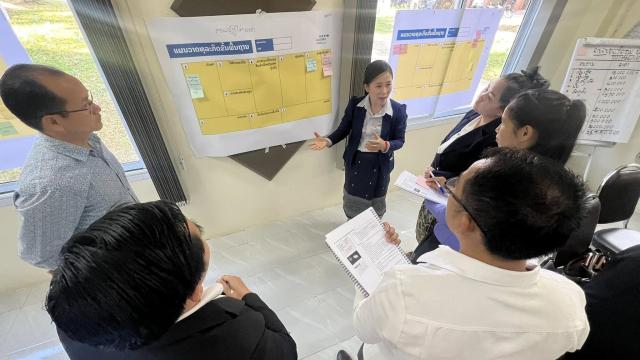Building entrepreneurial capacity in agriculture and forestry: a Training of Trainers initiative
Laos 26.06.2025 Projet
© Somsack DUANGPANYA

In Lao PDR, non-formal Basic Vocational Training has traditionally focused mainly on technical content. Trainers often lacked the capacity to help beneficiaries translate their technical skills into tangible income generation outcomes – such as how to set-up a micro or small business, where their investment in terms of time, money and other resources generates a reasonable return. Recognising this gap, the Skills for tourism, agriculture and forestry programme (STAF) supported the Ministry of Education and Sports, Department of Non-Formal Education to plan and implement a Training of Trainers initiative to equip trainers from Non-Formal Education Centres with the skills needed to support rural communities in launching and managing their micro/small agri-businesses.
Strategic partnerships and a cascading model for sustainable impact
Building on a similar initiative of the Swiss-financed and Swisscontact-implemented Vocational training and employment support services project, the Department of Non-Formal Education – with the support of the STAF programme – initially contracted 108.Jobs, a private company with prior experience in entrepreneurship training in Lao PDR to review existing similar initiatives and, drawing from lessons learned, adapt or develop training materials appropriate for integration in Basic Vocational Training for rural communities. The result was a four-day training curriculum and associated learning materials tailored specifically to support entrepreneurship amongst rural beneficiaries.
Following a cascading model, 108.Jobs then built the capacity of the Lao-India Entrepreneurship Development Centre (LIEDC) – a public institution (under the management of the Ministry of Education and Sports' Department of Technical and Vocational Education and Training) to serve as a master trainer. LIEDC, which specialises in entrepreneurship training for vocational and general education students, was equipped to deliver the new curriculum and adapt it to the needs of potential young agri-entrepreneurs in rural communities. This collaboration allowed a rich exchange of technical knowledge and ensured the curriculum was both technically sound and contextually relevant.
LIEDC then trained trainers from Non-Formal Education Centres in target provinces and districts. These trainers are now supporting rural youth in their entrepreneurial journeys, with LIEDC continuing to provide coaching and hands-on support to ensure quality and consistency in delivery.
The model promotes sustainability, cost-effectiveness, local ownership and long-term impact by embedding entrepreneurship training capacity within institutions in close proximity to rural communities.
Looking ahead
This initiative represents a significant shift in how Basic Vocational Training for agriculture and forestry is delivered — moving beyond technical skills to include developing an entrepreneurial mindset and acquiring some of the practical skills needed for sustainable income generation. As the district-level rollout continues, the Department of Non-Formal Education and STAF programme is laying the foundation for a more empowered, self-reliant rural workforce.

© Somsack DUANGPANYA
About the programme
The STAF programme, funded by the Grand Duchy of Luxembourg, the Swiss Agency for Development and Cooperation, and the European Union, and implemented by the Ministry of Education and Sports and LuxDev, the Luxembourg Development Cooperation Agency, is playing a key role in ensuring that vocational skills development students in Lao PDR receive not only relevant quality training but also the support needed to transition into the workforce or self-employment.
Découvrez aussi
Découvrez les dernières nouvelles de LuxDev et suivez l'évolution des projets et programmes de coopération mis en œuvre par l'Agence.
Toutes les actualités-

Mali 12.02.2026
Région de Kayes : 100 jeunes en formation pour répondre aux besoins réels du secteur privé
Région de Kayes : 100 jeunes en formation pour répondre aux besoins réels du secteur privé -

Sénégal 15.01.2026
Maguette et Awa, des scientifiques en devenir soutenues par la Coopération luxembourgeoise
Maguette et Awa, des scientifiques en devenir soutenues par la Coopération luxembourgeoise
